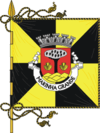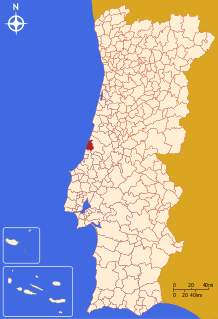Marinha Grande
Marinha Grande (Portuguese pronunciation: [mɐˈɾiɲɐ ˈɣɾɐ̃d(ɨ)] (![]()
Marinha Grande | |
|---|---|
 Flag  Coat of arms | |
 | |
| Coordinates: 39°45′N 8°56′W | |
| Country | |
| Region | Centro |
| Intermunic. comm. | Região de Leiria |
| District | Leiria |
| Parishes | 3 |
| Government | |
| • President | Cidália Ferreira (PS) |
| Area | |
| • Total | 187.25 km2 (72.30 sq mi) |
| Population (2011) | |
| • Total | 38,681 |
| • Density | 210/km2 (540/sq mi) |
| Time zone | UTC±00:00 (WET) |
| • Summer (DST) | UTC+01:00 (WEST) |
| Local holiday | Ascension Day (date varies) |
| Website | http://www.cm-mgrande.pt |
It is located right in the middle of the 700-year-old Leiria pine forest covering 100 square kilometres, and near excellent beaches such as Praia da Vieira, Nazaré, and São Pedro de Moel.
The present Mayor is Cidália Ferreira, elected by the Socialist Party. The municipal holiday is Ascension Day.
Parishes
Administratively, the municipality is divided into 3 civil parishes (freguesias):[3]
- Marinha Grande
- Moita
- Vieira de Leiria
History
The Pinhal de Leiria forest was first planted in the 13th century by Dom Afonso III and expanded by Dom Dinis as a barrier against the sands and to supply timber to the maritime industry.
The Marinha Grande glass manufacturing industry was first established in the middle of the 18th century. The Royal Glass Factory (Real Fabrica de Vidros) was bought by an English entrepreneur William Stephens who developed the factory and the business under the protection of the Marques de Pombal. The wood from the pine forest was used to fuel the factories. The former palatial home of William Stephens now contains the Museu do Vidro da Marinha Grande which houses glassware from the 17th to the 20th century. In 1826, the factory was given to the state and became one of the country's main producers of traditionally made fine crystal.[4]
Economy
Marinha Grande is Portugal's biggest glass manufacturer, and it is also the European capital for the moulding industry, with 250 companies operating there, rightfully giving the town the nickname 'The Crystal City'.
The city is served by a highway and a train line. It is a 1-hour 15-minute drive away from Lisbon, only 10 minutes away from Leiria and 45 minutes from Coimbra.
Tourism
The pine forest is an aromatic forest and has waymarked paths for walkers. It has several campsites within it. There is a cycle route from Marinha Grande to São Pedro de Moel on the coast. There are tours around the glass works and to the glass museums.
Sports
Atlético Clube Marinhense is the local team, it plays at Estádio Municipal da Marinha Grande, a venue shared in past with former Primeira Liga club, U.D. Leiria.
Hugo Gaspar, notable Portuguese volleyball player was born in Vieira de Leiria.
References
- Instituto Nacional de Estatística
- "Áreas das freguesias, concelhos, distritos e país". Archived from the original on 2018-11-05. Retrieved 2018-11-05.
- Diário da República. "Law nr. 11-A/2013, page 552 68" (pdf) (in Portuguese). Retrieved 28 July 2014.
- Travel in Portugal - Nazare - Marinha Grande